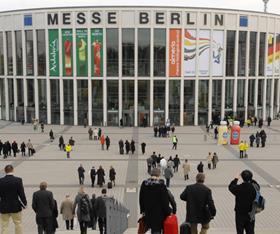
Fruit Logistica is introudcing the Logistics Hub, a new three-day series of events presented throughout next year's Berlin exhibition, which takes place on 3-5 February.
The sessions will address ten current issues relating to the logistics chain, designed to help producers, exporters and traders find the information they need to help them take the right logistic decisions when it comes to transporting their goods.
Supply chains are becoming longer and more complicated, sometimes spanning several continents. The right choice of logistic services can determine whether or not a fresh produce consignment can be sold. Fresh produce handling and logistics are essentially two sides of the same coin. If costs are unclear, it is impossible to set a price.
'Time to market' is a practical way to measure logistical efficiency, but there is more to it than that. Fresh produce can be shipped by sea, air, road, or in some cases, by rail. It is important to ensure that the delivery process for fresh produce on its way from farm to point of sale is adapted to the respective mode of transport.
'Logistics Hub' was designed and organised by Alex von Stempel, an experienced independent consultant in fresh produce logistics. He will moderate the event, which takes place on 3-5 February 2016 in the CityCube Berlin, Hall B, Stand C-04.
The programme is as follows:
Wednesday 3 February 2016
10.00 - 11:00 Understanding the Ins and Outs of Logistics
Shipping, trucking, storage, multimodalism and documentation are critical elements in determining how effective your supply chains are. Global and local product sourcing should go hand in hand with logistics procurement. This session will explain the basics.
11.00 - 12.00 Developing Logistics Solutions for Trade between Emerging Markets
Global purchasing power (consumer spending) is gradually shifting towards emerging economies. As a result demand for shipping services between emerging economies is also increasing. What are the critical issues to look out for?
14:00 -15:00 Air to Sea Transport: Risks and Pitfalls
There has been in inexorable trend from airfreight to seafreight in recent years. Will this trend continue? Yet oceanfreight and airfreight options continue to co-exist in other market segments. What are the critical success factors: technology, infrastructure or ‘proven’ business relationships? What is the role of changing supply chain configurations?
15:00 - 16:00 Innovative Perishable Logistics Concepts for the Emerging Produce e-commerce Markets
What is the effect of traditional retailers having to run several supply chains in parallel in order to keep up with the expectations of multi-channel shopping including rapidly developing e-commerce? How will this impact the logistics sector? From ‘DC by-pass’ to ‘retail by-pass’ and anticipatory shipping these and more logistics concept will be discussed in this session.
Thursday 4 February 2016
10:00 - 11:00 Strategic Cold Chain Investments and examining new Outsourcing Potential
As shipping fresh produce has shifted gradually from specialised (conventional) shipping to container shipping, the lack of adequate and cost-effective cold store facilities in Southern Hemisphere is becoming an increasing problem. Who should invest, why and where?
11:00 - 12:00 Reefer Claims: Addressing a Classic Clash of Interests
Despite of temperature recording technology having considerably improved over the years, claims against loss of cargo in transit have not gone away. Can you ‘ensure’ quality?
This session will be structured as a debate between cargo and shipping interests.
It will review controversial positions by highlighting some of the case that have gone to court and also ask why many cases remain unrecorded.
14:00 – 15:00 Focusing on the First Mile: Country and Produce
Case Study Africa Transport infrastructure access remains one of the most critical challenges for producers, exporters as well as traders in Southern hemisphere countries. Ensuring timely and reliable delivery of fresh produce to the quayside or chill rooms at airports can be difficult, especially for land-locked countries.
15:00 - 16:00 Focusing on the First Mile: Country and Produce Case Study Latin America
Privatisation projects of transport infrastructure in some Latin American countries have ground to a halt due to a variety of local political and social pressures. It is often left to the private initiative to make do with what is available and ‘hope for the best’. Adapting sourcing strategies to logistical realities on the ground can therefore be a daunting task.
Friday 5 February 2016
10.00 - 11:00 Frozen Vegetables - Opportunities, Challenges and Threats
Could frozen vegetables provide a viable alternative to fresh produce simply because frozen logistics are easier to organise and administer? What are innovative technical frozen produce solutions are there that would deliver ‘’quality produce” at a fraction of current fresh produce logistics prices?
11:00- 12:00 ‘Anything, anywhere, anytime’: What does this mean for the fresh produce sector?
Consumers now expect to have deliveries of FMCG and other goods at a mouse-click away. Supply chain technology providers have access to a huge amount of data that will drive same-day home delivery of fresh produce. Yet many hurdles remain. What does the trade actually need?



